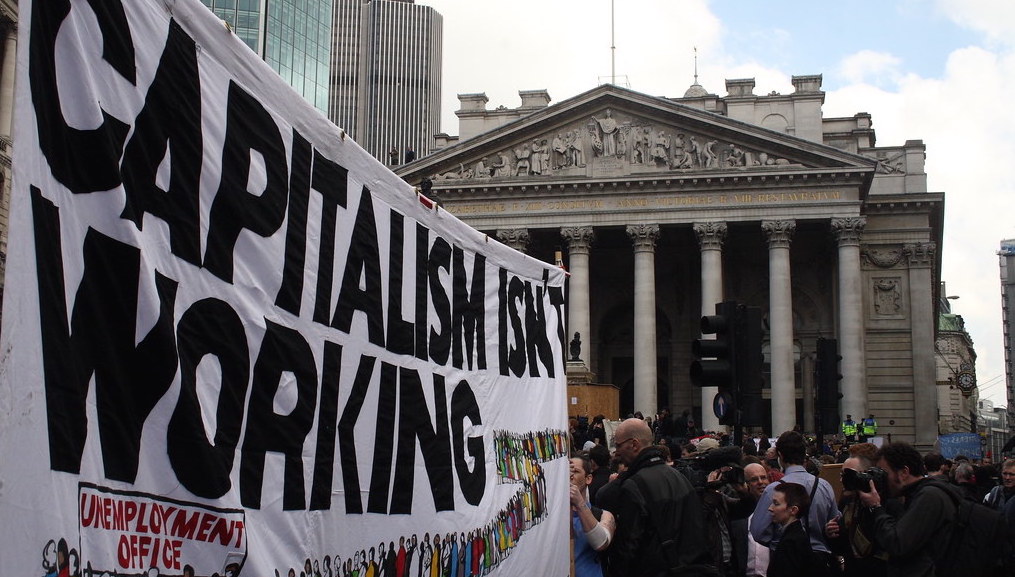This blog is the last of a three-part blog series based on a keynote presentation I gave at the Perspectives of Power conference organized by the Institute of Political Economy at Carleton University earlier this year. The first two blogs focused on water justice movements in Canada and how they are challenging extractivism and the commodification of water. (Read blogs one and two.) This part of the series outlines the sites of struggle in which power is contested and the role of water justice movements in a post-capitalist economy.
If we think about where power is manufactured and deployed, it is helpful to think about actual sites of struggles.
Some examples include:
- Creation of legislation: House of Commons, Standing Committees or Senate Committees, public consultations.
- Government departments: National Energy Board, Ontario’s Ministry of Environment
- Courts and legal challenges
- The physical location of projects: Nestle’s bottled water plants, along a pipeline route
- Government or corporate spaces: shareholders meetings, LNG event at Canada 2020
- Educational institutions: classrooms (Big Oil influencing what students learn at school), museums, university campuses
- “Public debate” in traditional media, social media
Examples of communities contesting power include climate strike rallies on Parliament Hill, legal challenges against the Trans Mountain pipeline, the Tiny House Warriors with their mission to stop the Trans Mountain pipeline from crossing unceded Secwepemc Territory, as well as creative actions at the Canada 2020 LNG event and at Catherine McKenna’s recent town hall.
It is also helpful to think about other areas where neoliberalism and capitalism, broadly, are strengthened, reinforced and advanced:
- Collective consciousness and how a society understands and talks about an issue, e.g. the federal government frames pipelines as a matter of national security rather than a threat to clean water.
- Within ourselves (our goals, the work we do, the beliefs we have), within our relationships and families (the roles we play, what work is paid and unpaid) and within our communities (how we relate to one another).
- Consumer and business relationships: where we shop, what is considered a good for sale, what we buy and if we buy.
It is important to think about and contest power structures at these sites and areas in order to advance water justice, climate justice, social justice, Indigenous rights, and human rights more generally.
At the same time, we need to be working to create the next economic system.
Writer and activist Rev. angel Kyodo williams points out, “…why has our imagination been stolen by capitalism in such a way that we can’t even imagine a different possibility for different economies and different ways of trading and being in relationship to one another?”
Activist and PBI-Canada’s executive director Brent Patterson notes that anti-capitalism is entering the mainstream — see recent comments by George Monbiot on BBC, Naomi Klein on Twitter and Phil McDuff’s article “Ending Climate Change Requires the End of Capitalism” in the Guardian.
This creates opportunities to imagine and explore ideas — some that have long been discussed and debated as well as new ones — for the next economic system.
Social movements and communities need to be simultaneously contesting norms and creating these alternatives. It is critical to contest power through rallies, creative and direct actions to advance social justice, Indigenous title and rights, and the human right to water. But we also need to find ways to create or support initiatives that foster alternative economies, decolonization, genuine democracy and cultures of equity, compassion and justice.
The United Nations is calling for transformative change and as BBC noted, “one big idea is to steer the world away from the ‘limited paradigm of economic growth.'” Greta Thunberg calls for “system change, not climate change” alongslide countless youth around the world who are taking part in weekly climate strikes under the banner “Fridays for Future”.
One idea for the next economy is the solidarity economy, which can be defined as an “economic system based around institutions — from food coops to community-owned renewables — that make decisions democratically, meet local needs and put people and planet over profit.” It also promotes “equity in every dimension including race, class and gender.”
A solidarity economy can also include give-away shops or gift economies, participatory budgeting, time banks, peer lending, barter systems, ideas around the commons, as well as neighbourhood councils and watershed councils.
Grassroots groups and the water justice movement — where Indigenous peoples, activists, scientists and other residents work together to protect water for people and ecosystems — will play a critical role in the next economy that prioritizes water justice over profit.
In Upstream Conversation, community organizer Cheyenna Weber notes that cooperatives and facets of the solidarity economy are already taking hold in communities around the world and that it’s important to understand them as one broad movement.
As climate, water and other crises require communities to transform the current capitalist economic system into a system that promotes climate, social, and other forms of justice, we can learn from communities in Jacksonville, New York, South America and globally that have begun the inspiring work of transitioning to the next economy.
To watch a recording of my keynote presentation at the Perspectives of Power conference at Carleton University, click here.
Emma Lui is an activist, a writer and a contributor to the book, Corporatizing Canada: Making Business out of Public Service.Photo: Jonny White/Flickr
Help make rabble sustainable. Please consider supporting our work with a monthly donation. Support rabble.ca today for as little as $1 per month!




